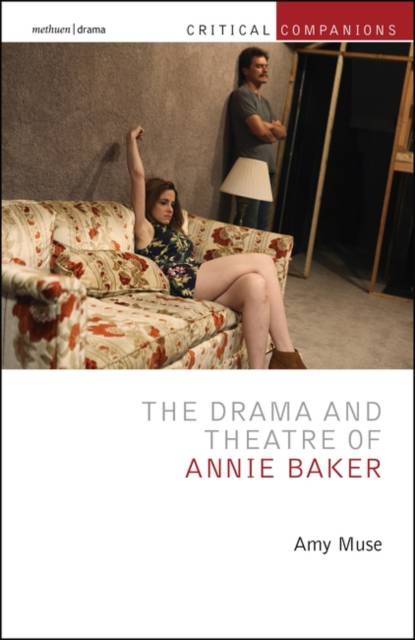
- Retrait gratuit dans votre magasin Club
- 7.000.000 titres dans notre catalogue
- Payer en toute sécurité
- Toujours un magasin près de chez vous
- Retrait gratuit dans votre magasin Club
- 7.000.0000 titres dans notre catalogue
- Payer en toute sécurité
- Toujours un magasin près de chez vous
195,45 €
+ 390 points
Description
In the first book-length study of Annie Baker, one of the most critically acclaimed playwrights in the United States today and winner of the 2014 Pulitzer Prize, a Guggenheim Fellowship, and a MacArthur "genius" grant, Amy Muse analyzes Baker's plays and other work. These include The Flick, John, The Antipodes, the Shirley Vermont plays, and her adaptation of Uncle Vanya.Muse illuminates their intellectual and ethical themes and issues by contextualizing them with the other works of theatre, art, theology, and psychology that Baker read while writing them.
Through close discussions of Baker's work, this book immerses readers in her use of everyday language, her themes of loneliness, desire, empathy, and storytelling, and her innovations with stage time. Enriched by a foreword from Baker's former professor, playwright Mac Wellman, as well as essays by four scholars, Thomas Butler, Jeanmarie Higgins, Katherine Weiss, and Harrison Schmidt, this is a companionable guide for students of American literature and theatre studies, which deepens their knowledge and appreciation of Baker's dramatic invention.
Muse argues that Baker is finely attuned to the language of the everyday: imperfect, halting, marked with unexpressed desires, banalities, and silence. Called "antitheatrical," these plays draw us back to the essence of theatre: space, time, and story, sitting with others in real time, witnessing the dramatic in the ordinary lives of ordinary people. Baker's revolution for the stage has been to slow it down and bring us all into the mystery and pleasure of attention.
Through close discussions of Baker's work, this book immerses readers in her use of everyday language, her themes of loneliness, desire, empathy, and storytelling, and her innovations with stage time. Enriched by a foreword from Baker's former professor, playwright Mac Wellman, as well as essays by four scholars, Thomas Butler, Jeanmarie Higgins, Katherine Weiss, and Harrison Schmidt, this is a companionable guide for students of American literature and theatre studies, which deepens their knowledge and appreciation of Baker's dramatic invention.
Muse argues that Baker is finely attuned to the language of the everyday: imperfect, halting, marked with unexpressed desires, banalities, and silence. Called "antitheatrical," these plays draw us back to the essence of theatre: space, time, and story, sitting with others in real time, witnessing the dramatic in the ordinary lives of ordinary people. Baker's revolution for the stage has been to slow it down and bring us all into the mystery and pleasure of attention.
Spécifications
Parties prenantes
- Auteur(s) :
- Editeur:
Contenu
- Nombre de pages :
- 208
- Langue:
- Anglais
- Collection :
Caractéristiques
- EAN:
- 9781350319974
- Date de parution :
- 10-08-23
- Format:
- Livre relié
- Format numérique:
- Genaaid
- Dimensions :
- 140 mm x 216 mm
- Poids :
- 390 g

Les avis
Nous publions uniquement les avis qui respectent les conditions requises. Consultez nos conditions pour les avis.






